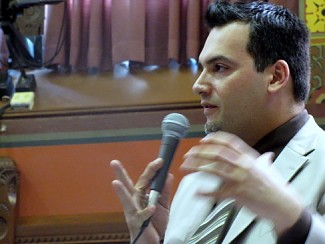
Hugh McQuaid Photo
Rep. Juan Candelaria, D-New Haven

May 12, 2011
HOUSE PASSES CONNECTICUT’S VERSION OF THE DREAM ACT
by Hugh McQuaid, CT News Junkie

Despite assertions by some lawmakers that a bill to offer in-state public college tuition rates to undocumented Connecticut students was unfair, the House of Representatives on Wednesday passed the measure with a 77-63 vote.
The bill would provide in-state rates to students without documentation of their citizenship who attended a fou-year high school in Connecticut and live in the state.
For much of the five-hour debate, Republicans objected to the measure on the grounds that it was fundamentally unfair. Several lawmakers who immigrated to the country stood to reinforce the point.
Rep. Selim Noujaim, R-Waterbury, began his remarks by joking through his Lebanese accent that his colleagues might not realize he is an immigrant. He spoke of the immigration process he undertook and his subsequent education.
“No one offered me tuition break. I had to work for every single penny I earned. So here we are right now saying that we are going to offer students, and I know it was not the fault of their own, I understand that, we’re saying we’re going to offer them an opportunity that someone had to work very, very hard to accomplish,” he said.
Noujaim questioned whether that offering was fair.
Rep. Tony Hwang, R-Fairfield, acknowledged the merits of the bill, to allow bright, ambitious, and potentially economically beneficial students into the community. But he too had issues based on fairness. Legislators must recognize the law, he said, which says the students are not legally in the country.
Rather than pass a measure that gives them in-state tuition rates, the state should focus on fast-tracking the students to become citizens, he said.
“Ultimately I will vote against this bill out of respect for my parents and so many other great immigrants that came into this country, immigrants who contributed so much in making this country great,” Hwang said. “But those same immigrants made an earnest and sincere effort to attain American citizenship.”
But Rep. Roberta Willis, co-chair of the Higher Education Committee, said that many of the students who would be impacted by the bill don’t even know they are not citizens until they ask the parents for their Social Security card to take the PSATs.
“In every sense, these children and students are Connecticut residents,” she said. “They’ve resided in Connecticut for most of their lives; they’ve attended and graduated from Connecticut schools. Their parents work here and pay taxes here and in many cases they own property here.”
Willis said there is no logical basis for denying the students an opportunity for education. Since it is not the policy of this country to hold children responsible for the actions of their parents, even calling them “illegal immigrants” is incorrect, she said.
Rep. Gary Holder-Winfield, D-New Haven, agreed with Willis. Many people are acquainted and have no problem with undocumented neighbors until they learn they were born outside the U.S., he said. Holder-Winfield said he had trouble understanding why someone would turn around and decide that their neighbor suddenly does not deserve an opportunity for education.
He called some of the debate ridiculous, pointing to an assertion by one lawmaker that the bill’s proponent, Rep. Juan Candelaria, D-New Haven, was an immigrant. Candelaria was born in Puerto Rico, making him a U.S. citizen at birth. Holder-Winfield said the mistake is evidence that the opponents of the bill don’t fully understand the issue.
House Minority Leader Larry Cafero said the measure may create situations where undocumented students are accepted to competitive schools, taking a spot that could have been filled by a student who is a citizen. He said also that the measure would complicate budgetary considerations for universities.
Colleges generate more revenue from out-of-state students, who pay more for tuition, he said. For that reason when schools decide which students to accept they strike a careful balance between in-state students and out-of-state students, he said. Universities do this as a budgetary planning exercise, he said.
But Cafero said that, under the measure, undocumented students would apply for in-state rates after the decision already has been made to accept them to the school.
“This bill seems to ignore that process,” he said. “In many cases the decision to accept that student to the university is based on whether he or she is in-state or out-of-state.”
Willis said the process is not quite as precise as Cafero implied. For one, it’s unlikely that undocumented students will be bumping other students out of slots at competitive colleges. She used the University of Connecticut as an example.
She used 2,800 as a ball park figure of how many freshmen UConn may accept in a semester. Given that the school has no way of knowing how many of the students who applied will decide to actually attend, the admissions office might accept 3,500 students, she said. How many in-state or out-of-state students the university ends up with will depend on how many students decide to attend, she said.
In addition, she said the law would likely only impact between 250 and 300 students.
Republicans offered four amendments before the debate ended. One of those amendments would have required undocumented students to perform 250 hours of community service for every year the attended college at in-state tuition rates.
Rep. Chris Coutu, R-Norwich, whose wife emigrated from Lithuania, said that 250 hours seemed to him a minimal requirement for beginning to earn citizenship. But the House rejected all amendments to the measure.
The bill will now move to the Senate where its fate is not certain.